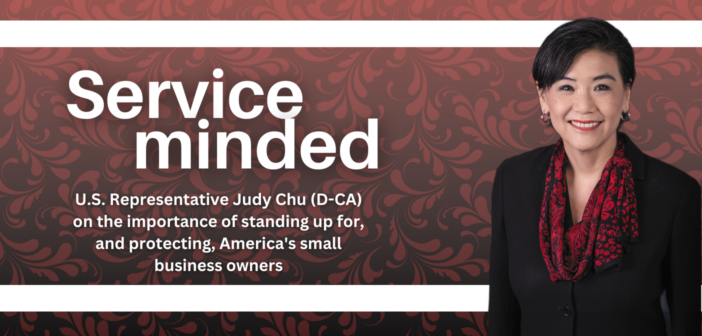U.S. Representative Judy Chu (D-CA) on the importance of standing up for, and protecting, America’s small business owners
Between near-constant travel and her district relying heavily on a tourism-based economy, U.S. Representative Judy Chu (D-CA) is tuned into the importance hotels play not just at home in the 28th District of California, but across the country. Holding a seat in Congress since 2009, Rep. Chu serves on several high-profile committees, and she has focused much time and effort on drafting and enacting legislation that protects small business owners and working-class Americans. Here, she discusses her background, why she feels called to public service, and much more.
WHAT ARE SOME OF YOUR LEGISLATIVE PRIORITIES THIS CONGRESS?
I will always fight for a progressive agenda – including reproductive rights, economic justice, environmental justice, and a foreign policy that best serves U.S. interests.
On the Ways & Means and Small Business Committees, I’ve been able to work with colleagues on the other side of the aisle to advance bipartisan legislation. The House passed my bipartisan bill, the Investing in Main Street Act, in the first month of this Congress, which would increase the percentage of capital and surplus that a bank or federal savings association may invest in small business investment companies (SBICs). And I just recently re-introduced the bipartisan Performing Arts Tax Parity Act, which would update the existing Qualified Performing Artist tax deduction to once again allow working class actors and performers to deduct the costs of their work-related expenses. Finally, I recently reintroduced the Acupuncture for our Seniors Act, which now has bipartisan support in Congress and would allow Seniors on Medicare to benefit from acupuncture treatment.
WHAT SORTS OF POLICIES, SUCH AS TAX AND REGULATORY REFORMS, DO YOU HOPE TO WORK ON TO SUPPORT SMALL BUSINESS OWNERS AND THE HOSPITALITY INDUSTRY?
One of my priorities as a member of the House Small Business Committee is ensuring access to capital and development assistance reaches every small business and entrepreneur in every community. This means not only expanding the government’s core lending programs like 504, 7(a), and microloans, but also ensuring that assistance makes its way into the hands of the small business owners who face the highest barriers. That’s why I’m working to introduce legislation to authorize the Community Advantage pilot loan program at the Small Business Administration (SBA), which provides loans and technical assistance to underserved businesses that have trouble accessing private financing and loans from traditional banks. Last Congress, I introduced the Community Advantage Loan Program Permanency Act, which would have improved the program and made it permanent. I’m thrilled that SBA Administrator Guzman has finalized a new rule at the agency that will provide more certainty for Community Advantage and enable more lenders to join – changes she modeled after my legislation. I’ll continue to work closely with Administrator Guzman on this rule and look forward to reintroducing legislation to provide statutory permanency for the program.
WHAT EXCITES YOU THE MOST ABOUT SERVING IN CONGRESS?
What got me into public service in the first place was the simple goal of helping people. I thought I could use the lessons I learned as a professor in the classroom in my first elected position on the Garvey School Board and support students, parents, and teachers. Now, being able to serve in Congress means I get to help support the community I’ve called home for most of my life get the resources and attention from the federal government it deserves. It also means I get to develop, draft, and pass legislation that improves people’s lives here in Southern California as well as across the country. Representing the San Gabriel Valley in Congress has also given me the chance to get to know so many people across our many communities, and having the opportunity to connect them to support from governments at all levels has always been exciting to me.
I thought I could use the lessons I learned as a professor in the classroom in my first elected position on the Garvey School Board and support students, parents, and teachers.
WHAT INDUSTRY (OR INDUSTRIES) DID YOU WORK IN BEFORE YOU WERE ELECTED TO CONGRESS?
I was in education, teaching in the community college system in Los Angeles County for two decades. While still teaching, I served in my first elected positions in the Garvey School Board and Monterey Park City Council. I decided to continue a career in public service in the California State Assembly and on the State Board of Equalization before I entered Congress.
WHAT LED YOU TO RUN FOR CONGRESS?
In 2009, President Barack Obama nominated then-Rep. Hilda Solis, a mentor of mine, to be our country’s Labor Secretary. That left an open congressional seat where I lived, and I thought I could use the lessons I learned throughout my decades in public service to use in Congress. I ran and won, and I will never forget President Obama calling me the morning after my election to congratulate me for being the first Chinese American woman ever elected to Congress! It was an incredible honor.

WHAT DO YOU ENJOY MOST ABOUT STAYING IN HOTELS?
As a Member of Congress, I travel across the country often, so I rely a lot on hotels when I can’t be home. That’s why I appreciate the work of all the hotel staff who put so much effort into making sure the hotel is kept clean, guests are safe, and that it’s a welcoming space for travelers.
WHY ARE HOTELS AND HOTEL OWNERS IMPORTANT TO YOUR DISTRICT/STATE?
Hotels are incredibly important in my district because of all the tourism in the region. The San Gabriel Valley is near so many popular tourist destinations like Hollywood, Los Angeles, the Rose Bowl in Pasadena, and so much more. On top of that, my district is a huge tourist destination for people that are visiting from China and Taiwan because the San Gabriel Valley is home to one of the largest Chinese American populations in the state, which means it’s easy to navigate for travelers who only speak Mandarin or Cantonese because there are plenty of restaurants and hotels where you can feel comfortable speaking your native language. That’s why hotels and their staff are so critical to our economy because without them we would lose the opportunity to capture all the economic growth associated with the tourism industry.
THE HOTEL WORKFORCE WAS ONE OF THE INDUSTRIES MOST AFFECTED BY THE PANDEMIC. DO YOU SEE CONGRESS PLAYING A ROLE TO SUPPORT BUILDING BACK THE HOTEL WORKFORCE?
When the pandemic struck, I was proud to play an integral part in shaping Congress’s historic response. As a member of the Small Business Committee, I worked with my colleagues to establish the Paycheck Protection Program, and I passed a law requiring the Small Business Administration (SBA) to provide its resources and guidance in non-English languages, including Asian languages. But, while pandemic-era programs have since phased out, I’m still working hard to help the hotel industry. One way Congress can do that is by helping to support the hospitality workforce. That is why I’m working through my position on the Ways and Means Committee to build on proven programs like the Earned Income Tax Credit (EITC), which helps to get more people into the workforce.




